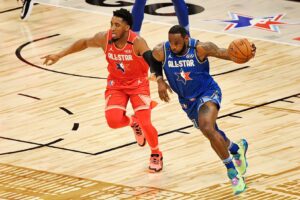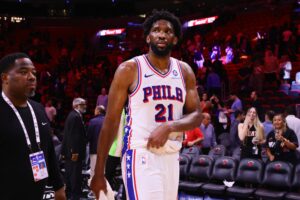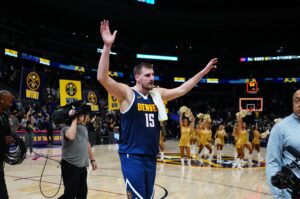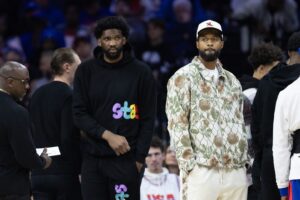The Boston Celtics decided to keep their core together by giving defensive stalwart Marcus Smart a lucrative extension. The 28-year-old guard received a four-year, $77.1-million deal, keeping him with the franchise until 2026.
ESPN Insider Bobby Marks broke down his contract.
Here’s the breakdown of the Marcus Smart extension:
💰2022/23- $17.2M
💸2023/24- $18.58M
💰2024/25- $19.96M
💸2025/26- $21.33MThe above extension was the maximum that Smart was allowed to sign for.
— Bobby Marks (@BobbyMarks42) August 17, 2021
Smart’s extension means Boston is committed to its core group of Jayson Tatum, Jaylen Brown and Smart moving forward. It makes the Celtics future very interesting to monitor.
Boston Celtics: Marcus Smart holds the key to the franchise’s future
Financial Implications
Smart’s extension effectively binds the Celtics to their core group of Tatum, Brown, and Smart. Tatum’s Rookie Max Extension begins this season while Brown is in the second year of his. Smart’s new extension doesn’t kick in until the 2022-23 season so he will be paid $13.8-million in 2021-22 with $500,000 in likely bonuses in 2020-21.
BOSTON CELTICS BIG 3 CONTRACTS (remaining)
Jayson Tatum
5-year, $163m (signed until 2025-26)Jaylen Brown
3-year, $80m (signed until 2023-24)Marcus Smart
5-year, $91.3m (signed until 2025-26)Brown's extension began in 2020-21, Smart has $14.3m left from his last contract.
— The Thunder Roundtable (@NBASkoolOfThort) August 19, 2021
Committing approximately $80-million dollars per season to three players is a huge commitment and limits their financial flexibility for the foreseeable future. To complicate matters, Brown will become an Unrestricted Free Agent in the Summer of 2024.
Stevens will be banking on at least one of two things:
- Tatum, Brown, and Smart lead Boston to another championship in the next few years
- Smart will be the center of another deal to acquire a superstar
Brad Stevens is positioning for a big move
Celtics General Manager Brad Stevens has done a magnificent job creating more financial flexibility for the franchise via a slew of moves. Stevens traded Walker and the 16th pick in the 2021 Draft to the Oklahoma City Thunder for Al Horford and a future second-round pick, potentially saving Boston around $30-million-dollars in salary.
Stevens then coordinated two other deals with the Sacramento Kings and Atlanta Hawks. He sent Tristan Thompson to Sacramento, acquired Kris Dunn, Bruno Fernando from Atlanta, and re-routed Delon Wright to the Hawks. Stevens then acquired Josh Richardson from Dallas using via its Trade Exception in exchange for Moses Brown. These deals put Boston at roughly $3.2-million below the luxury tax line.
However, this was short-lived as the team signed Free Agents Enes Kanter and Dennis Schroder. Kanter agreed to a $2.4-million veteran minimum deal while Schroder was signed for $5.9-million using the Mid-Level Exception (MLE).
These deals allow Boston to become a cap room team in 2022-23. As it stands, the Celtics sit $6.6-million in the luxury tax and enter the 2021-22 season with a $10.3-million luxury tax bill.
Smart, Tatum, and Brown are a perfect fit on the Boston Celtics
Smart’s value to the Celtics extends beyond numbers on the basketball court. He is a vocal leader in the locker room and brings an intense competitive fire that balances out the easy-going natures of Tatum and Brown. Tatum possesses a quiet and reserved demeanor while Brown is more playful and outgoing. The trio appears to complement each other’s personalities, forging a strong bond within a team setting.
On the floor, the trio forms a balanced three-headed monster when they play to their strengths. Tatum is a bonafide star in the NBA and is one of the best two-way players in the league. The 23-year-old is a three-level scorer with fantastic off-ball defensive instincts when dialed in. Tatum showed last season he is a superstar in this league averaging 26.4 points. This was further magnified after he dropped a 50-point bomb on the Brooklyn Nets in the first round of the playoffs.
Brown has taken considerable steps as an offensive force since his arrival in 2016. The 24-year-old averaged 24.7 points on 48-39-76 shooting splits and emerged as a fantastic secondary option alongside Tatum. Brown is also an excellent on-ball defender, capable of guarding the opposing team’s best player. He struggles with consistency off the ball but he is steady in a team setting.
Smart is purely a defensive presence who can heat up in a hurry from three. When locked in, he is a terrific overall defender with exceptional off-ball instincts and a physical body on-ball. Standing at just 6’3, Smart hounds stars every single night and plays much bigger than his stature. Smart’s growth as a passer over his career is a positive sign on the offensive end. Last year, he averaged a career-high 6.7 assists and assumed increased playmaking duties in the absence of Kemba Walker.
The trio is perfect for each other but did the 2020-21 season show some potential issues are on the horizon?
Is Boston’s defensive decline last year an anomaly or a future indicator?
One area of concern for the Celtics came on the defensive side of the ball. Despite possessing three of the NBA’s premier defensive players at their positions, Boston fell to 13th in defensive rating despite having a top 10 defense in the three years prior.
DEFENSIVE RATING (since Tatum, Brown, and Smart were assembled):
2017-18: 103.2 (2nd)
2018-19: 107.0 (7th)
2019-20: 106.5 (4th)
2020-21: 111.8 (13th)One notable decline came on the defensive end last season. It was a surprise given the team's talent level on Defense. https://t.co/ifgTZnHQYk
— The Thunder Roundtable (@NBASkoolOfThort) August 19, 2021
There are some simple explanations that could give insight into the defensive drop-off. One obvious reason is the change of roster personal over the last four years. Boston underwent a number of changes during this period which likely affected team chemistry.
Another reason could be the effects of COVID-19. Players entered Health and Safety Protocols at various points in the year affecting continuity. Tatum and Evan Fournier both missed time due to contracting the virus and were said to be heavily impacted by it.
Additionally, injuries across the league increased compared to the year prior. A condensed schedule likely contributed to this and Boston was no different. Smart and Brown both missed time recovering from various ailments.
Whatever the reason might be, it’s interesting to note that Smart had the biggest drop in defensive rating.
Marcus Smart's Defensive Rating since his arrival in the 2014-15 season.
2014-15: 104.2
2015-16: 103.3
2016-17: 107.9
2017-18: 104.4
2018-19: 107.1
2019-20: 107.2
2020-21: 113.2 https://t.co/Iv4oLC8tfp— The Thunder Roundtable (@NBASkoolOfThort) August 19, 2021
Individual Defensive Rating is one of the most controversial statistics in the NBA since it’s affected by numerous factors. However, it does suggest that Smart’s individual defense affects the team’s effectiveness.
He is the bonafide leader and the franchise needs his All-NBA Defense to be a strong defensive unit.
Final Thought
As good as he is, the Celtics’ present and future ultimately hinge on Smart. If he plays within himself and to his strengths, he makes the Celtics incredibly difficult to beat each night. However, if he elects to become the focal point of the offense, their ceiling is extremely low.
It’s difficult to judge whether Stevens signing him to an extension is positive or negative at this juncture. Smart is crucial to the team’s success but can he elevate his game to another level?
We will find out in due time.
Main Image: Embed from Getty Images






